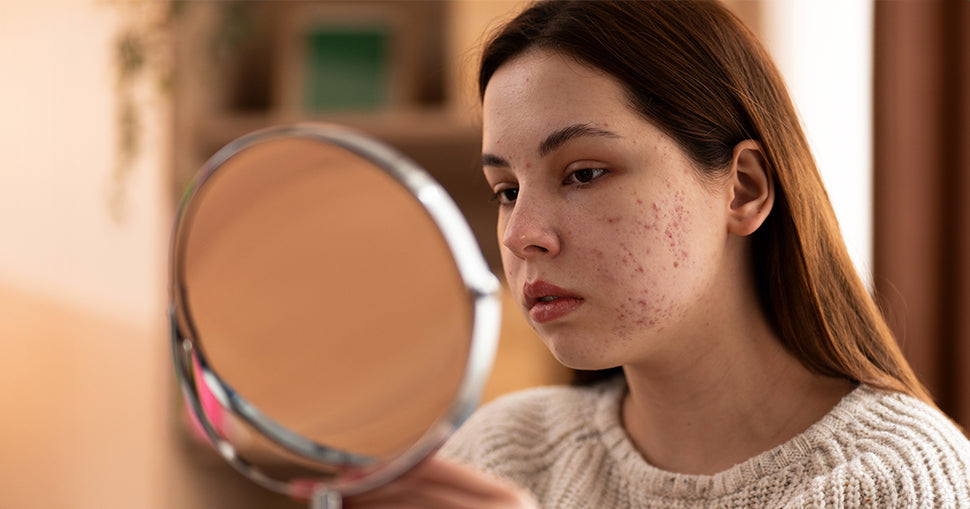Pigmentation Control Regimen: Collagen & Glutathione Supplements
02 Jul 2024
In recent years, the beauty and wellness industry has seen a surge in the popularity of supplements aimed at improving skin health. Among these, collagen and glutathione have emerged as key players in the quest for a radiant and even complexion. This blog explores how incorporating collagen and glutathione supplements into your daily routine can help control pigmentation, giving you a glowing and youthful appearance.
Understanding Skin Pigmentation
Before diving into the benefits of collagen and glutathione, it’s essential to understand what skin pigmentation is and what causes its irregularities. Skin pigmentation is determined by melanin, the natural pigment produced by cells called melanocytes. Melanin not only gives our skin its color but also protects it from the harmful effects of UV radiation.
However, several factors can disrupt the production of melanin, leading to hyperpigmentation or uneven skin tone. Common causes include:
- Sun Exposure:
UV radiation from the sun is one of the most significant contributors to skin pigmentation issues. When our skin is exposed to UV rays, it triggers the production of melanin as a protective response. Melanin absorbs UV radiation, reducing the risk of DNA damage in skin cells. However, chronic sun exposure can lead to overproduction and uneven distribution of melanin, resulting in sunspots and age spots.
Mechanism:
The process begins with the absorption of UVB and UVA rays by the skin. This energy leads to the activation of the enzyme tyrosinase in melanocytes, which catalyzes the production of melanin from the amino acid tyrosine. Over time, this increased melanin production can accumulate in specific areas, causing visible pigmentation such as solar lentigines (sunspots) and freckles.
- Hormonal Changes:
Hormonal fluctuations can also significantly affect melanin production, leading to conditions like melasma. Melasma is characterized by dark, discolored patches on the skin, often on the face. It is more common in women and is frequently associated with pregnancy, oral contraceptive use, and hormone replacement therapy.
Mechanism:
Hormonal changes increase the activity of melanocytes through the influence of estrogen and progesterone, which can enhance the production of tyrosinase, thereby increasing melanin synthesis. The exact mechanism is complex and involves various growth factors and signaling pathways that upregulate melanin production, leading to hyperpigmentation in localized areas.
- Inflammation:
Inflammation is another key factor that can cause pigmentation issues. Post-inflammatory hyperpigmentation (PIH) occurs when the skin overproduces melanin after an inflammatory response. This can result from conditions such as acne, eczema, psoriasis, or physical trauma to the skin.
Mechanism:
When the skin undergoes inflammation, it releases inflammatory mediators like prostaglandins and cytokines. These substances can stimulate melanocytes to produce more melanin. Additionally, the inflammatory process can damage the basal layer of the epidermis, where melanocytes reside, causing melanin to deposit abnormally in the upper layers of the skin. This leads to dark spots and patches that can persist long after the initial inflammation has subsided.
- Aging:
As we age, our skin undergoes several changes that can lead to uneven melanin distribution and the development of dark spots. Aging skin experiences a decline in the number of melanocytes, but those that remain tend to increase in size and produce melanin more irregularly. This results in areas of hyperpigmentation commonly referred to as age spots or liver spots.
Mechanism:
Aging affects the skin's ability to repair itself and maintain a uniform distribution of melanin. The reduction in collagen and elastin fibers weakens the skin's structure, while decreased cell turnover slows the removal of pigmented cells. Additionally, cumulative sun exposure over the years exacerbates these effects, leading to pronounced and stubborn pigmentation.
Collagen and Glutathione: The Power Duo
What is Glutathione?
Glutathione is a powerful antioxidant produced naturally in our cells. It consists of three amino acids: cysteine, glutamine, and glycine. Glutathione plays a crucial role in detoxifying the body, supporting the immune system, and most importantly for our discussion, in skin health and pigmentation control.
What is Collagen?
Collagen is the most abundant protein in the human body, making up about 75% of our skin’s dry weight. It provides structural support, strength, and elasticity to the skin. However, as we age, collagen production naturally declines, leading to wrinkles, sagging, and a loss of firmness.
How Glutathione Supplements Help with Pigmentation
- Powerful Antioxidant Properties
Glutathione is renowned for its antioxidant properties. It neutralizes free radicals and reduces oxidative stress, which can cause skin damage and uneven pigmentation. By protecting the skin from oxidative damage, glutathione helps to maintain a clear and even complexion.
- Inhibits Melanin Production
One of the most significant benefits of glutathione for pigmentation control is its ability to inhibit melanin production. Glutathione works by converting eumelanin (which is responsible for darker skin tones) to pheomelanin (which is responsible for lighter skin tones). This process helps to lighten dark spots and reduce overall pigmentation.
- Detoxifies the Skin
Glutathione also supports the body’s detoxification processes, which can have a positive impact on the skin. By aiding in the removal of toxins and impurities, glutathione helps to promote clearer, healthier skin, and reduce the appearance of pigmentation issues.
How Collagen Supplements Help with Pigmentation
- Boosts Skin Elasticity and Firmness
One of the primary benefits of collagen supplements is their ability to improve skin elasticity and firmness. By replenishing collagen levels, these supplements help restore the skin’s structure, making it more resilient and less prone to damage from environmental factors that can lead to pigmentation issues.
- Enhances Skin Hydration
Collagen also helps to maintain skin hydration. Well-hydrated skin is less likely to experience the dryness and flakiness that can exacerbate pigmentation problems. By keeping the skin moisturized, collagen supplements contribute to a more even skin tone and texture.
- Supports Skin Renewal
Collagen plays a vital role in the skin’s natural renewal process. It promotes the turnover of skin cells, helping to fade dark spots and hyperpigmentation over time. This renewal process is crucial for maintaining a youthful and even complexion.
Combining Collagen and Glutathione for Optimal Results
While collagen and glutathione are effective individually, combining them can provide even more significant benefits for pigmentation control and overall skin health. Here’s how you can incorporate these supplements into your daily routine for optimal results:
- Choosing the Right Supplements
Look for supplements that contain hydrolyzed collagen peptides, as these are more easily absorbed by the body. For glutathione, consider formulations with vitamin C to enhance absorption and effectiveness. When selecting collagen and glutathione supplements, it’s important to choose high-quality products from reputable brands. One such brand happens to be Setu’s Radiant Skin Combo which has Glutathione and Marine collagen to give you that youthful glow.
- Timing and Consistency
Consistency is key when it comes to seeing results from collagen and glutathione supplements. Incorporate them into your daily routine, and be patient, as it can take several weeks to months to notice significant improvements in your skin’s appearance.
- Sun Protection
Protecting your skin from the sun is crucial for preventing pigmentation issues. Use a broad-spectrum sunscreen with an SPF of 30 or higher daily, even on cloudy days. Wear protective clothing, hats, and sunglasses when spending extended periods outdoors.
- Healthy Diet
A diet rich in antioxidants, vitamins, and minerals can support skin health and reduce pigmentation. Incorporate plenty of fruits, vegetables, nuts, and seeds into your meals. Foods high in vitamin C, such as citrus fruits, strawberries, and bell peppers, can enhance collagen production and support glutathione levels.
- Hydration
Staying hydrated is essential for maintaining healthy skin. Drink plenty of water throughout the day to keep your skin hydrated and flush out toxins.
- Skincare Routine
A consistent skincare routine can complement the benefits of collagen and glutathione supplements. Use gentle cleansers, exfoliate regularly to promote skin cell turnover, and apply serums and moisturizers that contain ingredients like vitamin C, niacinamide, and hyaluronic acid.
Conclusion
Incorporating collagen and glutathione supplements into your daily regimen can be a powerful strategy for controlling pigmentation and achieving a radiant, youthful complexion. By understanding the unique benefits of these supplements and combining them with other healthy lifestyle practices, you can take significant steps towards improving your skin’s health and appearance.
Remember, while supplements can provide substantial benefits, they are most effective when used in conjunction with a holistic approach to skincare and wellness. Protect your skin from the sun, maintain a healthy diet, stay hydrated, and follow a consistent skincare routine to maximize the results of your pigmentation control efforts.
With patience and persistence, collagen and glutathione supplements can help you achieve the even, glowing skin you’ve always desired. Embrace the journey to better skin health and enjoy the confidence that comes with a flawless complexion.
Plant Protein + Veg Collagen
- ₹2,499
- ₹2,499
-
₹2,900 - ( 13% OFF)
Categories
- Choosing a selection results in a full page refresh.
- Press the space key then arrow keys to make a selection.
this is the sidecart
















